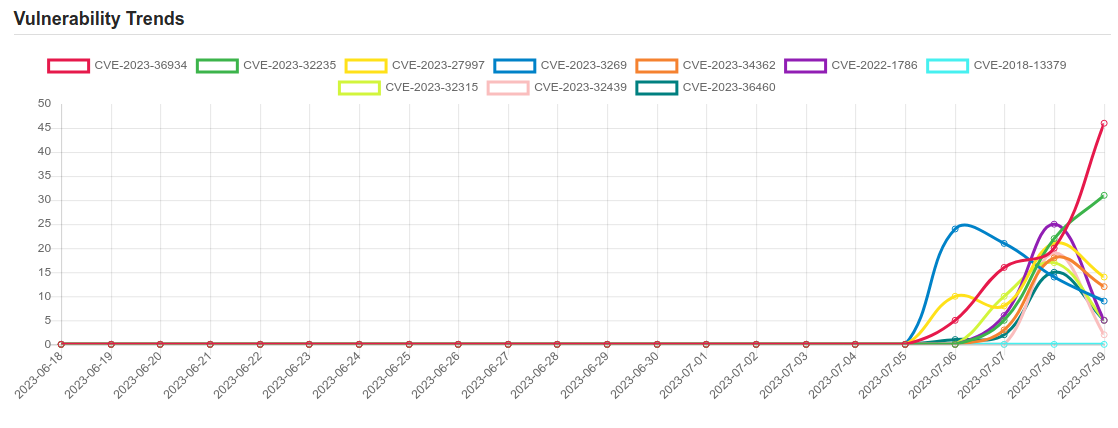Daily Vulnerability Trends: Mon Jul 10 2023

| CVE NAME | CVE Description |
| CVE-2022-1786 | A use-after-free flaw was found in the Linux kernel’s io_uring subsystem in the way a user sets up a ring with IORING_SETUP_IOPOLL with more than one task completing submissions on this ring. This flaw allows a local user to crash or escalate their privileges on the system. |
| CVE-2018-13379 | An Improper Limitation of a Pathname to a Restricted Directory (“Path Traversal”) in Fortinet FortiOS 6.0.0 to 6.0.4, 5.6.3 to 5.6.7 and 5.4.6 to 5.4.12 and FortiProxy 2.0.0, 1.2.0 to 1.2.8, 1.1.0 to 1.1.6, 1.0.0 to 1.0.7 under SSL VPN web portal allows an unauthenticated attacker to download system files via special crafted HTTP resource requests. |
| CVE-2023-32315 | Openfire is an XMPP server licensed under the Open Source Apache License. Openfire’s administrative console, a web-based application, was found to be vulnerable to a path traversal attack via the setup environment. This permitted an unauthenticated user to use the unauthenticated Openfire Setup Environment in an already configured Openfire environment to access restricted pages in the Openfire Admin Console reserved for administrative users. This vulnerability affects all versions of Openfire that have been released since April 2015, starting with version 3.10.0. The problem has been patched in Openfire release 4.7.5 and 4.6.8, and further improvements will be included in the yet-to-be released first version on the 4.8 branch (which is expected to be version 4.8.0). Users are advised to upgrade. If an Openfire upgrade isn’t available for a specific release, or isn’t quickly actionable, users may see the linked github advisory (GHSA-gw42-f939-fhvm) for mitigation advice. |
| CVE-2023-32439 | A type confusion issue was addressed with improved checks. This issue is fixed in iOS 16.5.1 and iPadOS 16.5.1, Safari 16.5.1, macOS Ventura 13.4.1, iOS 15.7.7 and iPadOS 15.7.7. Processing maliciously crafted web content may lead to arbitrary code execution. Apple is aware of a report that this issue may have been actively exploited. |
| CVE-2022-34878 | SQL Injection vulnerability in User Stats interface (/vicidial/user_stats.php) of VICIdial via the file_download parameter allows attacker to spoof identity, tamper with existing data, allow the complete disclosure of all data on the system, destroy the data or make it otherwise unavailable, and become administrators of the database server. |
| CVE-2023-25717 | Ruckus Wireless Admin through 10.4 allows Remote Code Execution via an unauthenticated HTTP GET Request, as demonstrated by a /forms/doLogin?login_username=admin&password=password$(curl substring. |
| CVE-2021-22893 | Pulse Connect Secure 9.0R3/9.1R1 and higher is vulnerable to an authentication bypass vulnerability exposed by the Windows File Share Browser and Pulse Secure Collaboration features of Pulse Connect Secure that can allow an unauthenticated user to perform remote arbitrary code execution on the Pulse Connect Secure gateway. This vulnerability has been exploited in the wild. |
| CVE-2023-3531 | Cross-site Scripting (XSS) – Stored in GitHub repository nilsteampassnet/teampass prior to 3.0.10. |
| CVE-2022-29303 | SolarView Compact ver.6.00 was discovered to contain a command injection vulnerability via conf_mail.php. |
| CVE-2023-2136 | Integer overflow in Skia in Google Chrome prior to 112.0.5615.137 allowed a remote attacker who had compromised the renderer process to potentially perform a sandbox escape via a crafted HTML page. (Chromium security severity: High) |
| CVE-2023-36934 | In Progress MOVEit Transfer before 2020.1.11 (12.1.11), 2021.0.9 (13.0.9), 2021.1.7 (13.1.7), 2022.0.7 (14.0.7), 2022.1.8 (14.1.8), and 2023.0.4 (15.0.4), a SQL injection vulnerability has been identified in the MOVEit Transfer web application that could allow an unauthenticated attacker to gain unauthorized access to the MOVEit Transfer database. An attacker could submit a crafted payload to a MOVEit Transfer application endpoint that could result in modification and disclosure of MOVEit database content. |
| CVE-2023-32235 | Ghost before 5.42.1 allows remote attackers to read arbitrary files within the active theme’s folder via /assets/built%2F..%2F..%2F/ directory traversal. This occurs in frontend/web/middleware/static-theme.js. |
| CVE-2023-27997 | A heap-based buffer overflow vulnerability [CWE-122] in FortiOS version 7.2.4 and below, version 7.0.11 and below, version 6.4.12 and below, version 6.0.16 and below and FortiProxy version 7.2.3 and below, version 7.0.9 and below, version 2.0.12 and below, version 1.2 all versions, version 1.1 all versions SSL-VPN may allow a remote attacker to execute arbitrary code or commands via specifically crafted requests. |
| CVE-2023-3269 | No description provided |
| CVE-2023-34362 | In Progress MOVEit Transfer before 2021.0.6 (13.0.6), 2021.1.4 (13.1.4), 2022.0.4 (14.0.4), 2022.1.5 (14.1.5), and 2023.0.1 (15.0.1), a SQL injection vulnerability has been found in the MOVEit Transfer web application that could allow an unauthenticated attacker to gain access to MOVEit Transfer’s database. Depending on the database engine being used (MySQL, Microsoft SQL Server, or Azure SQL), an attacker may be able to infer information about the structure and contents of the database, and execute SQL statements that alter or delete database elements. NOTE: this is exploited in the wild in May and June 2023; exploitation of unpatched systems can occur via HTTP or HTTPS. All versions (e.g., 2020.0 and 2019x) before the five explicitly mentioned versions are affected, including older unsupported versions. |
A considerable amount of time and effort goes into maintaining this website, creating backend automation and creating new features and content for you to make actionable intelligence decisions. Everyone that supports the site helps enable new functionality.
If you like the site, please support us on “Patreon” or “Buy Me A Coffee” using the buttons below
To keep up to date follow us on the below channels.

![Sliver C2 Detected - 185[.]142[.]184[.]147:31337 3 Sliver C2](https://www.redpacketsecurity.com/wp-content/uploads/2024/02/Sliver-C2-300x142.jpg)
